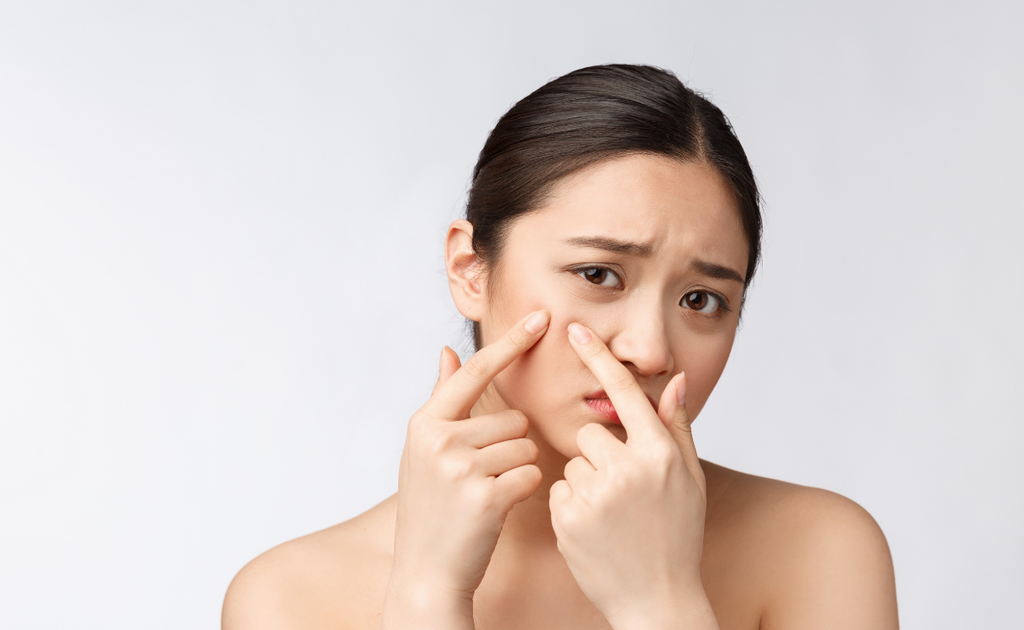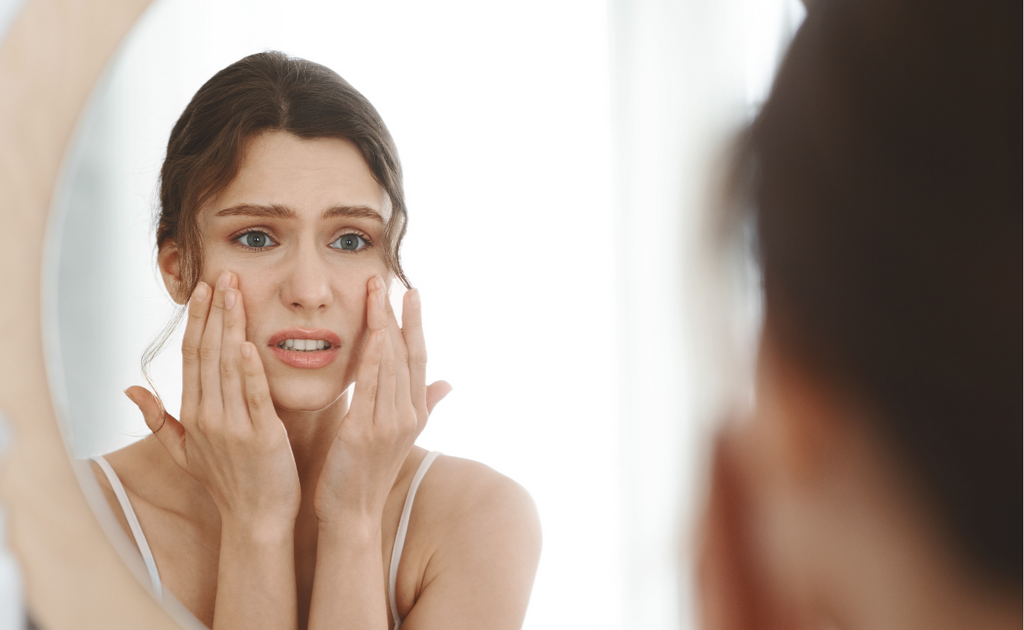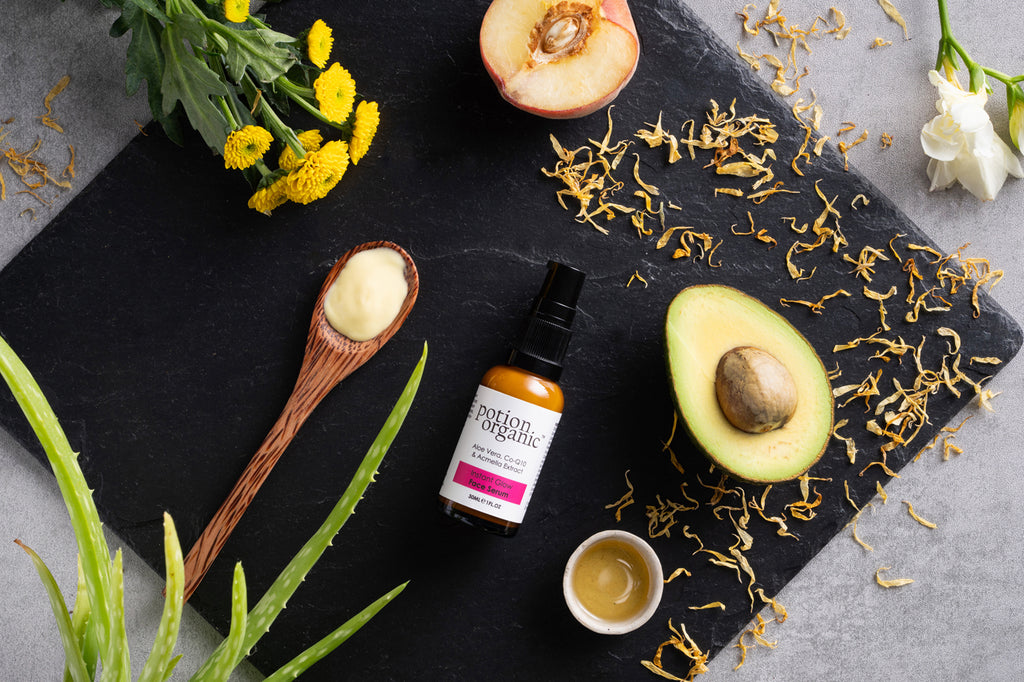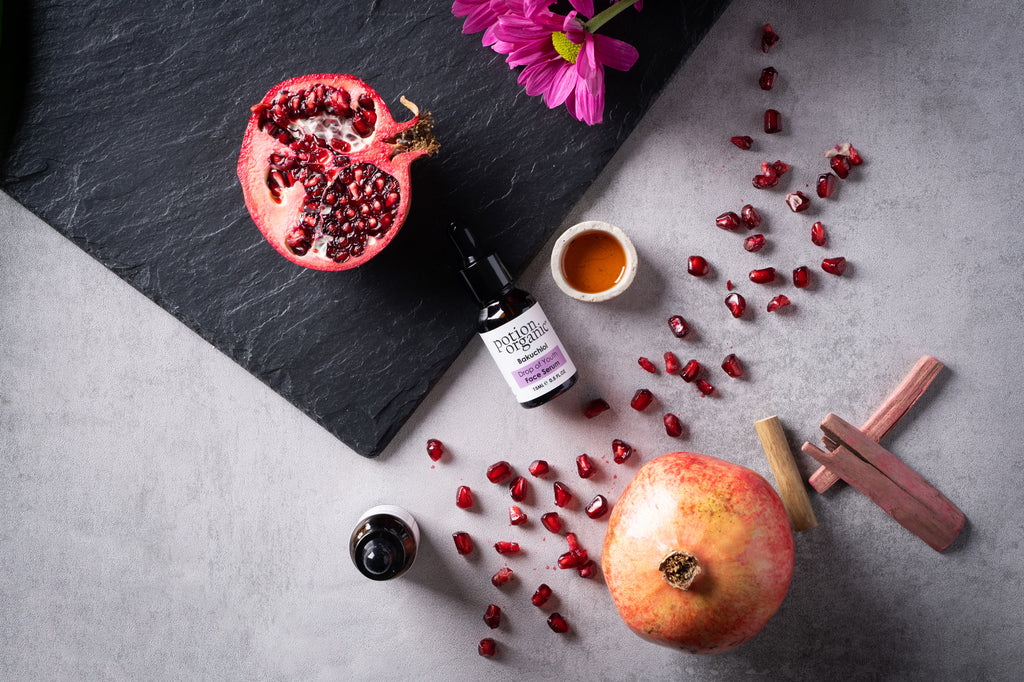Understanding Stressed Skin & How to Tackle It
How to Deal with Stressed Skin: A Comprehensive Guide
Stressed skin refers to skin that appears dull, tired, irritated, or breakout-prone due to various external and internal factors.
Common causes include environmental stressors like pollution and UV rays, lifestyle habits such as poor diet or lack of sleep, and internal factors like hormonal imbalances or dehydration. Furthermore, mental and emotional stress can also manifest themselves on the skin, triggering inflammation and impairing the skin's ability to regenerate. If you're dealing with stressed skin, don't worry - we've got you covered.
Here's a comprehensive guide on how to deal with stressed skin and restore its natural glow.
 Managing stress acne can be a long-term process and requires patience. The best way to prevent stress acne and maintain healthy skin is to manage your stress level in your life.
Managing stress acne can be a long-term process and requires patience. The best way to prevent stress acne and maintain healthy skin is to manage your stress level in your life.
Signs Your Skin Is Stressed
Recognizing the signs of stressed skin is the first step towards effective treatment. Here are some key indicators:
- Dullness: Stressed skin often loses its natural glow, appearing dull and lifeless. This is usually due to a lack of hydration or an overproduction of skin-dulling cells.
- Redness & Irritation: Inflammation is a common response to stress, which can manifest as redness, irritation, or even rash on the skin.
- Breakouts: Stress can trigger hormone fluctuations, leading to increased oil production and subsequent acne breakouts.
- Dryness: The skin's barrier function can be disrupted under stress, causing a loss of moisture and resulting in dry, flaky skin.
- Fine Lines & Wrinkles: Prolonged stress can accelerate the aging process, contributing to the premature appearance of fine lines and wrinkles.
- Sensitivity: Stressed skin may become more reactive to skincare products or environmental triggers, resulting in increased sensitivity.
Pay attention to these signs to identify the stress level of your skin and take the necessary measures for its care and rejuvenation.
 Blocked hair follicles and oil glands are main contributors to acne causing bacteria according to the cosmetic dermatology and may lead to a permanent skin disease.
Blocked hair follicles and oil glands are main contributors to acne causing bacteria according to the cosmetic dermatology and may lead to a permanent skin disease.
The Effects of Stress on Skin
Stress exerts a profound impact on skin health, often exacerbating existing conditions and even triggering new ones.
For instance, stress can worsen conditions like psoriasis, rosacea, and eczema. Psoriasis, a condition resulting from rapid skin cell turnover, can flare up during stressful periods. Similarly, rosacea, a skin ailment that causes flushing and redness, can be aggravated by stress.
Eczema, characterized by itchy, inflamed patches of skin, also tends to worsen under stress. Furthermore, stress can lead to the development of hives, a skin reaction resulting in red, itchy welts. Moreover, as stress triggers an inflammatory response in the body, it can also lead to acne breakouts.
Stress-induced hormone fluctuations stimulate the sebaceous glands to produce more oil, which can clog pores and result in acne. Also, if you have a habit of touching your face or picking at your skin when stressed, this can introduce bacteria and further contribute to acne development. Therefore, managing stress is a crucial component of maintaining skin health and combating these conditions.
 The way to treat stress acne, a mild acne with clogged pores is thorough a healthy diet, exercises and appropriate skincare routine.
The way to treat stress acne, a mild acne with clogged pores is thorough a healthy diet, exercises and appropriate skincare routine.
Everyday Habits That Stress Your Skin
Common Habits That Contribute to Skin Stress
While external factors and internal imbalances often contribute to skin stress, our everyday habits can unwittingly exacerbate the issue. Here are some common practices that might be harming your skin:
- Neglecting Sunscreen: Exposure to UV rays without adequate protection can cause significant damage to your skin, leading to premature aging, sunburn, and increasing the risk of skin cancer. Regular application of sunscreen is essential to protect your skin.
- Inadequate Sleep: Lack of quality sleep affects the skin's ability to regenerate, resulting in dull, tired-looking skin. Aim for 7-9 hours of sleep per night to allow your skin to rejuvenate properly.
- Poor Diet: A diet high in processed foods, sugar and unhealthy fats can lead to skin inflammation and breakouts. Include more fruits, vegetables, lean proteins and healthy fats in your diet for skin health.
- Dehydration: Not drinking enough water leaves your skin dry and dull. Adequate hydration helps maintain skin elasticity and promotes a healthy complexion.
- Over-exfoliating: While exfoliation is necessary for skin cell turnover, overdoing it can strip your skin of its natural oils, leading to dryness and irritation.
- Using Unsuitable Skincare Products: Not all skincare products are suitable for everyone. Using products that don't match your skin type can disrupt your skin's pH balance and cause irritation and breakouts.
Remember, your daily habits significantly influence the health and appearance of your skin. Making small changes can go a long way in reducing skin stress and promoting a healthy, radiant complexion.
 Psychological stress in life can cause stress acne, stress hormones / hormonal acne, one of the methods to help with chronic stress is to apply relaxation techniques such as yoga and meditation.
Psychological stress in life can cause stress acne, stress hormones / hormonal acne, one of the methods to help with chronic stress is to apply relaxation techniques such as yoga and meditation.
Strategies to De-stress Your Skin
To alleviate skin stress, incorporating certain strategies can be highly beneficial:
- Adopt a Balanced Diet: Consuming a balanced diet rich in antioxidants, vitamins, and minerals helps support skin health. Foods high in omega-3 fatty acids, such as fish and walnuts, can reduce inflammation and promote skin hydration.
- Stay Hydrated: Drinking plenty of water throughout the day helps maintain skin's elasticity and promotes a healthy complexion. Using a good quality moisturizer can also help lock in the skin's natural moisture.
- Follow a Consistent Skincare Routine: Establishing a daily skincare routine with products designed for your skin type can play a key role in managing skin stress. This routine should include cleansing, toning, moisturizing, and regular exfoliation.
- Limit Sun Exposure and Use Sunscreen: Sun exposure can lead to premature aging and skin damage. Use a broad-spectrum sunscreen daily and reapply it every two hours when you're outdoors.
- Get Adequate Sleep: During sleep, our bodies and skin heal and regenerate. Ensure you're getting at least 7-9 hours of quality sleep each night.
- Exercise Regularly: Regular physical activity can increase your circulation, helping to nourish your skin. Additionally, sweating can help clear out your pores.
- Manage Stress: Engage in stress-reducing activities such as yoga, meditation or breathing exercises. Lowering stress levels can have a positive impact on skin health.
- Avoid Touching Your Face: Constant touching and picking at your skin can spread bacteria and lead to breakouts. Try to keep your hands off your face as much as possible.
By adopting these strategies, you can effectively manage skin stress and maintain a healthy, glowing complexion.
 Acene flares are body's inflammatory response and weakening of the immune system as a stress affect on skin conditions.
Acene flares are body's inflammatory response and weakening of the immune system as a stress affect on skin conditions.
Skincare Routine
A skincare routine for stressed skin needs to be both effective and calming. Here's a simple routine that you can incorporate into your daily schedule:
- Cleansing: Start your day by gently washing your face with a cleanser suitable for your skin type. Choose a product that is free from harsh chemicals to avoid further stressing your skin.
- Toning: Use a toner after cleansing to restore your skin's natural pH balance. Opt for alcohol-free toners as they are less likely to dry out your skin.
- Serum Application: Apply a serum that is rich in antioxidants like vitamin C or E. These can help to combat the damaging effects of stress on your skin.
- Moisturizing: A good moisturizer is essential to hydrate and protect your skin. If your skin is particularly stressed, consider using a moisturizer with soothing ingredients like aloe vera or chamomile.
- Sun Protection: Before stepping out, use a broad-spectrum sunscreen to protect your skin from harmful UV rays. Even on cloudy days, UV rays can penetrate and damage your skin.
- Night-time Routine: Before bed, remove all your makeup and follow up with your cleansing, toning, and moisturizing routine. You can also include a stress-relief face mask once or twice a week for a deeper level of care.
- Eye Cream: The delicate skin around the eyes can also suffer from stress. Use an eye cream to hydrate and reduce puffiness.
 Board certified dermatologist recommends many over the counter spot treatments benzoyl peroxide and salicylic acid, most important thing is to consult a doctor or pharmacist before applying any of the treatments.
Board certified dermatologist recommends many over the counter spot treatments benzoyl peroxide and salicylic acid, most important thing is to consult a doctor or pharmacist before applying any of the treatments.
What type of products can help calming stressed skin?
When it comes to products specifically targeted towards calming stressed skin, there are a few key ingredients to look for. Best products for stressed skin will include:
- Hyaluronic Acid: Known for its hydrating properties, hyaluronic acid can help replenish the skin's moisture barrier and improve its overall texture.
- Chamomile: This soothing ingredient has anti-inflammatory properties that can help calm irritated skin and reduce redness.
- Aloe Vera: Another calming ingredient, aloe vera has been used for centuries to treat various skin conditions. It helps hydrate and soothe the skin, making it an excellent choice for stressed skin.
- Antioxidants: Look for products that contain antioxidants such as vitamin C, E, or green tea extract. These can help protect the skin from free radicals and reduce signs of stress on the skin.
- Skin calming natural oils: Oils like jojoba, rosehip, and almond can help nourish and soothe the skin. Look for these ingredients in your moisturizer or facial oil.
When looking for products to calm stressed skin, it's also essential to avoid harsh chemicals and fragrances that can further irritate the skin. Opt for gentle, nourishing products that promote overall skin health.
Stressed Skin Remedies at Potion Organic
The skin-soothing properties of Potion Organic products are largely derived from their unique, carefully selected organic ingredients.
The Instant Glow Organic Face Serum, infused with the powerful antioxidants, aloe vera extract, and regenerative Rosehip and Avocado oils, soothes the skin while enhancing its natural glow.
Similarly, the Blue Marine Face Cream, with its hyaluronic acid, tamanu oil, and marine algae extract, hydrates and soothes the skin, reducing redness and inflammation.
The Earth's Goodness Beauty Balm brings the healing properties of Calendula extract, Pumpkin oil, Borage oil, and Kokum butter directly to your skin, alleviating dryness and sensitive skin conditions.
Finally, the Skin Nourishing Organic Face Oils, featuring Cucumber Seed Oil, Prickly Pear Seed Oil, Blackcurrant Seed Oil and the Drop of Youth Face Serum with Pomegranate extract and Watermelon seed oil, not only nourish the skin but also provide a soothing, calming effect, ensuring a healthy and radiant complexion.
Resources:
https://www.mayoclinic.org/diseases-conditions/bags-under-eyes/symptoms-causes/syc-20369927 Suh DH, et al. (2011).
A multicenter epidemiological study of acne vulgaris in Korea. DOI: https://doi.org/10.1111/j.1365-4632.2010.04726.x Zari S, & Alrahmani D. (2017).
The association between stress and acne among female medical students in Jeddah, Saudi Arabia. DOI: https://doi.org/10.2147/CCID.S148499 Zhang B, et al. (2020).
Hyperactivation of sympathetic nerves drives depletion of melanocyte stem cells. DOI: https://doi.org/10.1038/s41586-020-1935-3


